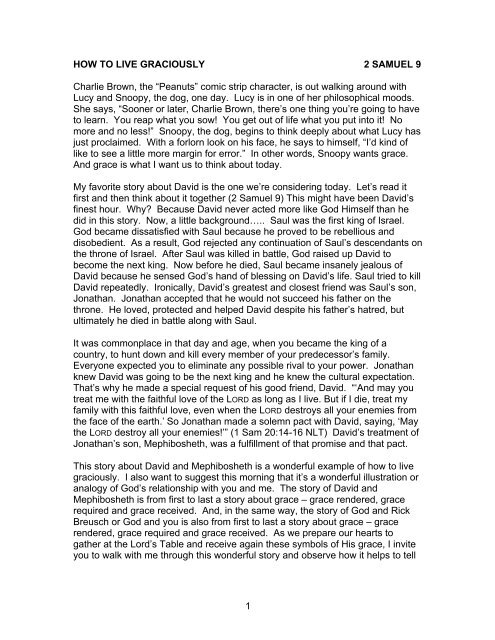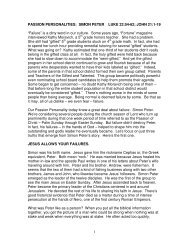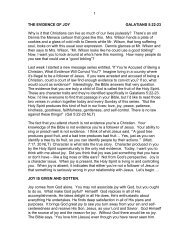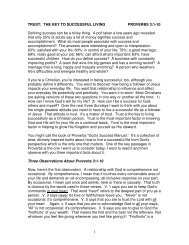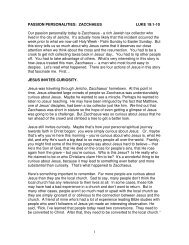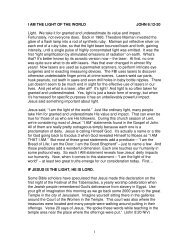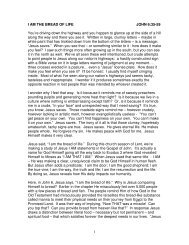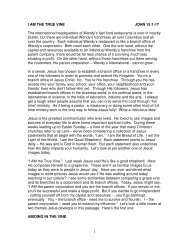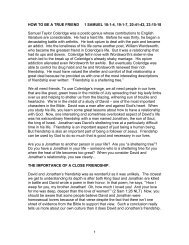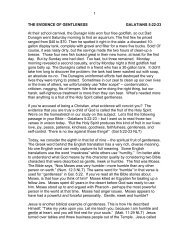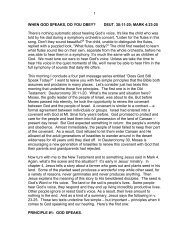1 HOW TO LIVE GRACIOUSLY 2 SAMUEL 9 Charlie Brown, the ...
1 HOW TO LIVE GRACIOUSLY 2 SAMUEL 9 Charlie Brown, the ...
1 HOW TO LIVE GRACIOUSLY 2 SAMUEL 9 Charlie Brown, the ...
You also want an ePaper? Increase the reach of your titles
YUMPU automatically turns print PDFs into web optimized ePapers that Google loves.
<strong>HOW</strong> <strong>TO</strong> <strong>LIVE</strong> <strong>GRACIOUSLY</strong> 2 <strong>SAMUEL</strong> 9<br />
<strong>Charlie</strong> <strong>Brown</strong>, <strong>the</strong> “Peanuts” comic strip character, is out walking around with<br />
Lucy and Snoopy, <strong>the</strong> dog, one day. Lucy is in one of her philosophical moods.<br />
She says, “Sooner or later, <strong>Charlie</strong> <strong>Brown</strong>, <strong>the</strong>re’s one thing you’re going to have<br />
to learn. You reap what you sow! You get out of life what you put into it! No<br />
more and no less!” Snoopy, <strong>the</strong> dog, begins to think deeply about what Lucy has<br />
just proclaimed. With a forlorn look on his face, he says to himself, “I’d kind of<br />
like to see a little more margin for error.” In o<strong>the</strong>r words, Snoopy wants grace.<br />
And grace is what I want us to think about today.<br />
My favorite story about David is <strong>the</strong> one we’re considering today. Let’s read it<br />
first and <strong>the</strong>n think about it toge<strong>the</strong>r (2 Samuel 9) This might have been David’s<br />
finest hour. Why? Because David never acted more like God Himself than he<br />
did in this story. Now, a little background….. Saul was <strong>the</strong> first king of Israel.<br />
God became dissatisfied with Saul because he proved to be rebellious and<br />
disobedient. As a result, God rejected any continuation of Saul’s descendants on<br />
<strong>the</strong> throne of Israel. After Saul was killed in battle, God raised up David to<br />
become <strong>the</strong> next king. Now before he died, Saul became insanely jealous of<br />
David because he sensed God’s hand of blessing on David’s life. Saul tried to kill<br />
David repeatedly. Ironically, David’s greatest and closest friend was Saul’s son,<br />
Jonathan. Jonathan accepted that he would not succeed his fa<strong>the</strong>r on <strong>the</strong><br />
throne. He loved, protected and helped David despite his fa<strong>the</strong>r’s hatred, but<br />
ultimately he died in battle along with Saul.<br />
It was commonplace in that day and age, when you became <strong>the</strong> king of a<br />
country, to hunt down and kill every member of your predecessor’s family.<br />
Everyone expected you to eliminate any possible rival to your power. Jonathan<br />
knew David was going to be <strong>the</strong> next king and he knew <strong>the</strong> cultural expectation.<br />
That’s why he made a special request of his good friend, David. “‘And may you<br />
treat me with <strong>the</strong> faithful love of <strong>the</strong> LORD as long as I live. But if I die, treat my<br />
family with this faithful love, even when <strong>the</strong> LORD destroys all your enemies from<br />
<strong>the</strong> face of <strong>the</strong> earth.’ So Jonathan made a solemn pact with David, saying, ‘May<br />
<strong>the</strong> LORD destroy all your enemies!’” (1 Sam 20:14-16 NLT) David’s treatment of<br />
Jonathan’s son, Mephibosheth, was a fulfillment of that promise and that pact.<br />
This story about David and Mephibosheth is a wonderful example of how to live<br />
graciously. I also want to suggest this morning that it’s a wonderful illustration or<br />
analogy of God’s relationship with you and me. The story of David and<br />
Mephibosheth is from first to last a story about grace – grace rendered, grace<br />
required and grace received. And, in <strong>the</strong> same way, <strong>the</strong> story of God and Rick<br />
Breusch or God and you is also from first to last a story about grace – grace<br />
rendered, grace required and grace received. As we prepare our hearts to<br />
ga<strong>the</strong>r at <strong>the</strong> Lord’s Table and receive again <strong>the</strong>se symbols of His grace, I invite<br />
you to walk with me through this wonderful story and observe how it helps to tell<br />
1
<strong>the</strong> story above all stories – <strong>the</strong> story of God’s grace to sinful human beings like<br />
you and like me. Think with me, first of all, how this story is about …<br />
GRACE RENDERED<br />
I want you to notice that David ra<strong>the</strong>r than Mephibosheth takes <strong>the</strong> initiative in<br />
this relationship. This story of grace begins with David’s questions, “… ‘Is<br />
anyone in Saul’s family still alive—anyone to whom I can show kindness for<br />
Jonathan’s sake?... If so, I want to show God’s kindness to <strong>the</strong>m.’” (2 Sam 9:1,3<br />
NLT) When David hears about Mephibosheth, we’re told that he went out and<br />
got him and brought him to <strong>the</strong> palace in Jerusalem. What’s <strong>the</strong> point? The<br />
point is David sought out Mephibosheth; Mephibosheth did not seek out David.<br />
In just <strong>the</strong> same way, God initiates a relationship with you. God sought you out;<br />
you did not seek out God. Oh, you might think you made <strong>the</strong> first move towards<br />
God, but you’ll eventually recognize that God was already working in your life<br />
perhaps in hidden ways long before you began to pursue Him. If God hadn’t sent<br />
Jesus into this world to die and rise again, your only destiny would be slavery to<br />
sin in this world and Hell for all eternity. If God hadn’t sent <strong>the</strong> Holy Spirit to you<br />
to convict you of your sin and enable your heart to respond to God’s grace, you<br />
would be lost and cut off from God. Jesus recognized fully who took <strong>the</strong> first step<br />
when He said, “‘For <strong>the</strong> Son of Man came to seek and save those who are lost.’”<br />
(Luke 19:10 NLT) None of us ever seek God at our own initiative. Grace is all<br />
about God taking <strong>the</strong> first step – taking <strong>the</strong> initiative – to reach out to us.<br />
Why did David want to show grace to Mephibosheth? For <strong>the</strong> sake of his great<br />
friend, Jonathan. In o<strong>the</strong>r words, David wanted to show kindness to<br />
Mephibosheth on <strong>the</strong> basis of his relationship to someone else. He says to<br />
Mephibosheth, “‘Don’t be afraid!... I intend to show kindness to you because of<br />
my promise to your fa<strong>the</strong>r, Jonathan….’” (2 Sam 9:7 NLT) Why is that<br />
important? It’s clear that David’s kindness towards Mephibosheth wasn’t based<br />
on Mephiboseth’s worthiness. David’s grace didn’t depend on who<br />
Mephibosheth character. He hadn’t done anything to earn or deserve David’s<br />
grace. In fact, David could have felt threatened by Mephibosheth. Yes, he was<br />
<strong>the</strong> son of David’s greatest friend, Jonathan, but he was also <strong>the</strong> grandson of his<br />
greatest enemy, King Saul. Mephibosheth had a claim to <strong>the</strong> throne. David had<br />
a reason to eliminate him. Mephibosheth had nothing David needed, deserved<br />
nothing good or gracious from David and could offer nothing to David that David<br />
needed <strong>the</strong>n or in <strong>the</strong> future. From a human perspective, Mephibosheth was<br />
more of a potential liability to David than an asset. But David extended grace to<br />
Mephibosheth on <strong>the</strong> basis of someone else – Jonathan.<br />
There’s a wonderful parallel right <strong>the</strong>re in terms of God’s relationship with you.<br />
God <strong>the</strong> Fa<strong>the</strong>r offers grace to you on <strong>the</strong> basis of someone else – His Son, <strong>the</strong><br />
Lord Jesus Christ – who died on <strong>the</strong> cross for your sins and was raised to life<br />
three days later. God’s grace doesn’t rest on any worthiness in you. It doesn’t<br />
2
depend on your character or reputation. You’ve done nothing to earn or deserve<br />
God’s grace. Just like Mephibosheth, you offer nothing to God that He needs;<br />
you deserve nothing good or gracious from Him and you can give Him nothing<br />
that God needs now or in <strong>the</strong> future. In fact, God has good reason to eliminate<br />
you because you’re a sinner. You rebelled against Him by adopting an approach<br />
to life that shut Him out. And even though you might be a follower of Jesus now,<br />
you still struggle with sin. You still fall short of God’s standards both in your<br />
attitudes and actions.<br />
So why does God continue to put up with you? Yes, He loves you – that’s true.<br />
But He continues to extend His grace to you on <strong>the</strong> basis of someone else –<br />
Jesus. Over in <strong>the</strong> New Testament, we read, “Once we, too, were foolish and<br />
disobedient. We were misled and became slaves to many lusts and pleasures.<br />
Our lives were full of evil and envy, and we hated each o<strong>the</strong>r. But—‘When God<br />
our Savior revealed his kindness and love, he saved us, not because of <strong>the</strong><br />
righteous things we had done, but because of his mercy. He washed away our<br />
sins, giving us a new birth and new life through <strong>the</strong> Holy Spirit. He generously<br />
poured out <strong>the</strong> Spirit upon us through Jesus Christ our Savior. Because of his<br />
grace he declared us righteous and gave us confidence that we will inherit<br />
eternal life.’” (Titus 3:3-7 NLT) The story of David and Mephibosheth – and <strong>the</strong><br />
story of God and you - is about grace rendered. It’s also a story about …<br />
GRACE REQUIRED<br />
Did Mephibosheth need grace? Did he ever! We’re told how he lost <strong>the</strong> use of<br />
his legs. “Saul’s son Jonathan had a son named Mephibosheth, who was<br />
crippled as a child. He was five years old when <strong>the</strong> report came from Jezreel that<br />
Saul and Jonathan had been killed in battle. When <strong>the</strong> child’s nurse heard <strong>the</strong><br />
news, she picked him up and fled. But as she hurried away, she dropped him,<br />
and he became crippled.” (2 Sam 4:4 NLT) So, through no fault of his own,<br />
Mephibosheth lost <strong>the</strong> use of his legs at an early age. Then, again,<br />
Mephibosheth had every reason to believe that David wanted to kill him. He<br />
might well have been in hiding before David reached out to him. Mephibosheth<br />
was in a world of hurt – a young man who was in a hopeless and helpless<br />
situation. He was caught up in forces and circumstances beyond his control.<br />
Again, Mephibosheth is an illustration of <strong>the</strong> state of every human being. Just as<br />
Mephibosheth was crippled physically, you are crippled spiritually. Sin – this<br />
innate spiritual rejection of and rebellion against God has infected all of our<br />
attitudes and actions. It’s crippled all of us. None of us are able to walk in a way<br />
spiritually that honors or pleases <strong>the</strong> Lord. Whe<strong>the</strong>r we’re conscious of it or not,<br />
sin has made us hostile to God. Just like Mephibosheth hid from David, we hide<br />
from God. We’re afraid of Him. We think He’s out to get us. I was interested to<br />
learn that <strong>the</strong> name Mephibosheth literally means “one who scatters shame” or “a<br />
shameful thing.” One of <strong>the</strong> inevitable results of sin in your life and mine is<br />
shame, isn’t it? Sin creates a vicious cycle in your life. Sin begins with an<br />
3
attitude or an action of rebellion against God. You insist on living life your way<br />
regardless of what God wants. Rebellion results in guilt – you now feel and know<br />
that you’re estranged from God. Rebellion leads to shame which is this feeling<br />
that you’re a worthless creature not deserving of God’s love or grace.<br />
Ultimately, sin leads to spiritual bondage. You’re stuck in your sins – lying,<br />
stealing, lusting, gossiping, coveting, hating, being arrogant, being selfish, being<br />
judgmental – whatever. Just like Mephibosheth, you and I are in desperate need<br />
of God’s grace. Now, give Mephibosheth credit. It’s clear he recognized his<br />
need for grace. “…When he came to David, he bowed low to <strong>the</strong> ground in deep<br />
respect. David said, ‘Greetings, Mephibosheth.’ Mephibosheth replied, ‘I am<br />
your servant.’… Mephibosheth bowed respectfully and exclaimed, ‘Who is your<br />
servant, that you should show such kindness to a dead dog like me?’” (2 Sam<br />
9:6, 8 NLT) Mephibosheth knew he didn’t deserve David’s kindness. All he<br />
could do was accept David’s grace with sincere gratitude.<br />
It’s important to remember that you don’t have any claim on <strong>the</strong> grace of God<br />
ei<strong>the</strong>r. You don’t have any right to it. You can’t put <strong>the</strong> word “grace” and<br />
“deserve” toge<strong>the</strong>r. If something is in anyway deserved, it’s not longer grace.<br />
Grace is getting something you don’t deserve. You didn’t earn it through good<br />
behavior. You didn’t buy it or pay for it. You just receive it with <strong>the</strong> same attitude<br />
you see in Mephibosheth: humility and gratitude. That’s how you can spot<br />
someone who has truly experienced God’s grace. Grace can never make you<br />
proud or arrogant. Grace never portrays an attitude that suggests, “Well, God<br />
just ought to love me because I’m so wonderful. God ought to forgive my sins<br />
because I’m such a nice person. God ought to let me into Heaven because I’m<br />
such a moral person. The Bible says, “… ‘God opposes <strong>the</strong> proud but favors <strong>the</strong><br />
humble.’” (1 Pt 5:5 NLT)<br />
Keeping an attitude of perpetual humility and gratitude is by no means automatic.<br />
Even followers of Jesus can get bored with “God stuff”, become indifferent to His<br />
church, drift away from any time of meaningful prayer or interaction with God’s<br />
Word or start to live lives dominated by sinful attitudes and actions. What about<br />
you this morning? You received Jesus as your Savior. You were baptized –<br />
maybe even in this very church. But do <strong>the</strong> things of God, and <strong>the</strong> worship of<br />
God, and <strong>the</strong> people of God and <strong>the</strong> mission of God produce a surge of<br />
excitement or a yawn of boredom? The evidence of grace received can never<br />
look bored, or proud or entitled. A true experience of grace shows itself in a<br />
perpetual, eternal attitude of humility and gratitude. Is that how it is with you and<br />
God? Are you, like Mephibosheth, profoundly, deeply and perpetually humble<br />
and thankful? The story of David and Mephibosheth – and <strong>the</strong> story of God and<br />
you – is about grace rendered and grace required. It’s also a story about…<br />
GRACE RECEIVED<br />
4
How did David’s grace change Mephibosheth’s life? Well, in some of <strong>the</strong> same<br />
ways that God’s grace changes your life. First of all, Mephibosheth received life.<br />
David had <strong>the</strong> power to kill him. Instead, David offered him not only his life, but<br />
an exalted life – a life lived with King David himself. God would be entirely just in<br />
sending you away to an eternity in Hell for your sins against Him. But, instead,<br />
God offers you an exalted life - a life beyond your imagination - with <strong>the</strong> King of<br />
kings and Lord of lords forever and ever. The evidence of grace received is life.<br />
Secondly, Mephibosheth received peace. He was hiding from David in fear for<br />
his life. He probably thought that he was in mortal danger from <strong>the</strong> most<br />
powerful man in <strong>the</strong> country. What’s <strong>the</strong> first thing David says to Mephibosheth?<br />
“‘Don’t be afraid!...’” (2 Sam 9:7 NLT) Are you afraid? Is <strong>the</strong>re something that<br />
you fear intensely and you know exactly what it is this morning? Or, instead, do<br />
you have this kind of anonymous anxiety clinging to <strong>the</strong> edges of your life robbing<br />
you of peace? What does <strong>the</strong> Bible say about God, grace and peace?<br />
“Therefore, since we have been made right in God’s sight by faith, we have<br />
peace with God because of what Jesus Christ our Lord has done for us.” (Rom<br />
5:1 NLT) It also says, “Don’t worry about anything; instead, pray about<br />
everything. Tell God what you need, and thank him for all he has done. Then you<br />
will experience God’s peace, which exceeds anything we can understand. His<br />
peace will guard your hearts and minds as you live in Christ Jesus.” (Ph 4:6-7<br />
NLT) The evidence of grace received is peace.<br />
Thirdly, Mephibosheth received an inheritance. David gave him all <strong>the</strong> property<br />
that belonged to King Saul and Jonathan. He ordered Ziba, Saul’s servant, to<br />
farm <strong>the</strong> land so that Mephibosheth would always have provision for <strong>the</strong> future.<br />
That sounds wonderfully gracious, but David was determined to be in even more<br />
gracious. David says to Mephibosheth, “… ‘I will give you all <strong>the</strong> property that<br />
once belonged to your grandfa<strong>the</strong>r Saul and you will eat here with me at <strong>the</strong><br />
king’s table!’” (2 Sam 9:7 NLT) What an honor! Mephibosheth was invited to<br />
have constant access to and fellowship with <strong>the</strong> king! But it indicated even more<br />
than having a place of honor. The text says, “… And from that time on,<br />
Mephibosheth ate regularly at David’s table, like one of <strong>the</strong> king’s own sons.” (2<br />
Sam 9:11 NLT) It was as if David adopted Mephibosheth into his own family. He<br />
treated him like his own son. Mephibosheth enjoyed an incredible inheritance.<br />
He was provided for by <strong>the</strong> king, invited to enjoy fellowship with <strong>the</strong> king and he<br />
became part of <strong>the</strong> king’s family. Here’s what <strong>the</strong> Bible says about God’s grace<br />
and you. “And since we are his children, we are his heirs. In fact, toge<strong>the</strong>r with<br />
Christ we are heirs of God’s glory….” (Rom 8:17 NLT) You’ve been given an<br />
inheritance. The King of kings promises to provide for you. The King of kings<br />
invites you to enjoy fellowship with Him. The King of kings invites you to become<br />
part of His family. The evidence of grace received is an inheritance.<br />
As you know, I like to end Sunday’s messages with a story of some kind. Today<br />
I want to close with ano<strong>the</strong>r story about David and Mephibosheth that builds on<br />
<strong>the</strong> story we’ve considered today. It reveals what happens when grace has done<br />
5
its good work in a heart and a life. Years passed with David as <strong>the</strong> king of Israel.<br />
Ano<strong>the</strong>r great crisis entered David’s life when his son, Absalom – dynamic,<br />
charismatic, handsome Absalom – tried to remove his fa<strong>the</strong>r, David, as king. He<br />
almost succeeded. David had to flee Jerusalem. On <strong>the</strong> way out of <strong>the</strong> city,<br />
David meets up with Ziba, Mephibosheth’s servant. Mephibosheth was not with<br />
him and David asked Ziba why. Ziba said, “He stayed in Jerusalem. He thinks<br />
<strong>the</strong>re’s a chance that <strong>the</strong> people of Israel will make him king since he’s Saul’s<br />
grandson.” Ziba was lying, but David foolishly believed him without checking out<br />
<strong>the</strong> facts. Right <strong>the</strong>n and <strong>the</strong>re, he gave all of Mephibosheth’s property to Ziba.<br />
Well, David finally prevailed over his son, Absalom, and he returned to Jerusalem<br />
to resume his reign as king of Israel.<br />
In 2 Samuel 19 we have <strong>the</strong> story of David’s encounter with Mephibosheth upon<br />
returning to Jerusalem after this horrific crisis with Absalom. Let’s read verses<br />
verse 24 - 30. I don’t know why David only returned half of Mephibosheth’s<br />
property and let Ziba retain <strong>the</strong> o<strong>the</strong>r half. Some suggest that he did that to test<br />
Mephibosheth’s sincerity. But <strong>the</strong> point is found <strong>the</strong>re in verse 30 where<br />
Mephibosheth says, “… ‘Let him take everything, now that my lord <strong>the</strong> king has<br />
arrived home safely.’” Mephibosheth had come to love David for who David was<br />
not for what David had given him or what he could get out of David.<br />
Mephibosheth just wanted to be with David. Grace had done its good work in<br />
Mephibosheth’s heart and life. Do you know how you can tell if God’s grace has<br />
done its work in your heart and life? When grace has been fully received and<br />
experienced, you want God simply for who He is even more than for what God<br />
has given you or what you can get out of God. Only God satisfies your heart.<br />
I love how <strong>the</strong> story of David and Mephibosheth ends <strong>the</strong>re in 2 Samuel 9:13,<br />
“ And Mephibosheth lived in Jerusalem, because he always ate at <strong>the</strong> king’s<br />
table….” He always ate at <strong>the</strong> king’s table. This morning you’re invited to eat at<br />
<strong>the</strong> King’s table, too. Here are <strong>the</strong> symbols of His grace – His body broken for<br />
you; His blood shed for you. Come and get filled up again this morning – filled up<br />
with God’s kindness, filled up with God’s love, filled up with God’s grace. Grace<br />
rendered. Grace required. Grace received. Join me at <strong>the</strong> King’s table!<br />
6


